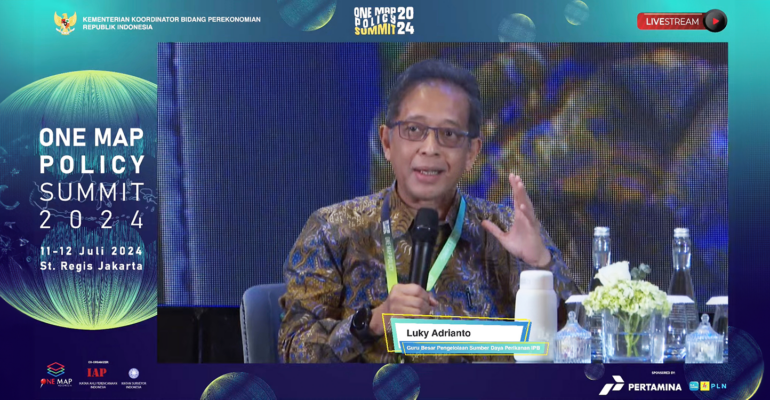Responding to One Map Policy, IPB University Professor Notes

Prof Luky Adrianto, Professor of Fisheries Resource Management at IPB University, said that land and sea spatial management plans in the One Map Policy (KSP) must be interconnected. According to him, government spatial management is also important and needs to be included in the KSP framework.
He conveyed this in a talk show session at the One Map Policy Summit 2024 event held by the Coordinating Ministry for Economic Affairs, Friday (12/7), at the Main Ballroom of the St Regis Hotel Jakarta.
He said the move was in response to the transformation of the economy based on the blue economy which is explicitly stated in the technocratic documents of the National Medium-Term Development Plan (RPJMN) and the Long-Term Development Plan (RPJP). Prof Luky said, the context of blue economy governance must discuss terrestrial and marine aquatic ecosystems, and not only discuss the fisheries sector.
“My note for the One Map Policy is not only a matter of integration within the framework of basic maps or thematic maps, but the linking (between the governance of land and sea waters),” he said.
“Although the maritime sector is important, if there is no integrated spatial planning from land, the marine sector cannot be a healthy economic source,” he continued.
Interconnecting spatial planning and linking spatial science are important, he added. Moreover, in the context of planning and preparation of marine spatial governance is three dimensional. The policy must also be placed in the thematic context of KSP.
The acceleration of KSP, according to him, requires multi-stakeholder support, for example by sharing funding that can be part of the KSP context. “With a note that the protocol, standardization of mapping, and surveys are also part of the standardization of the one map policy methodology, especially related to the exclusive economic zone (ZEE),” explained Prof Luky.
Not only a technical matter of thematic maps, the governance policy must also be integrated. According to him, governance management also needs to be included in the KSP framework because there are 35 agencies involved.
“This policy is also an (example) of the principle of transformative ocean governance (TOG) which I think needs to be adopted by Indonesia as the largest marine country,” he concluded.(MW) (IAAS/Hap)



